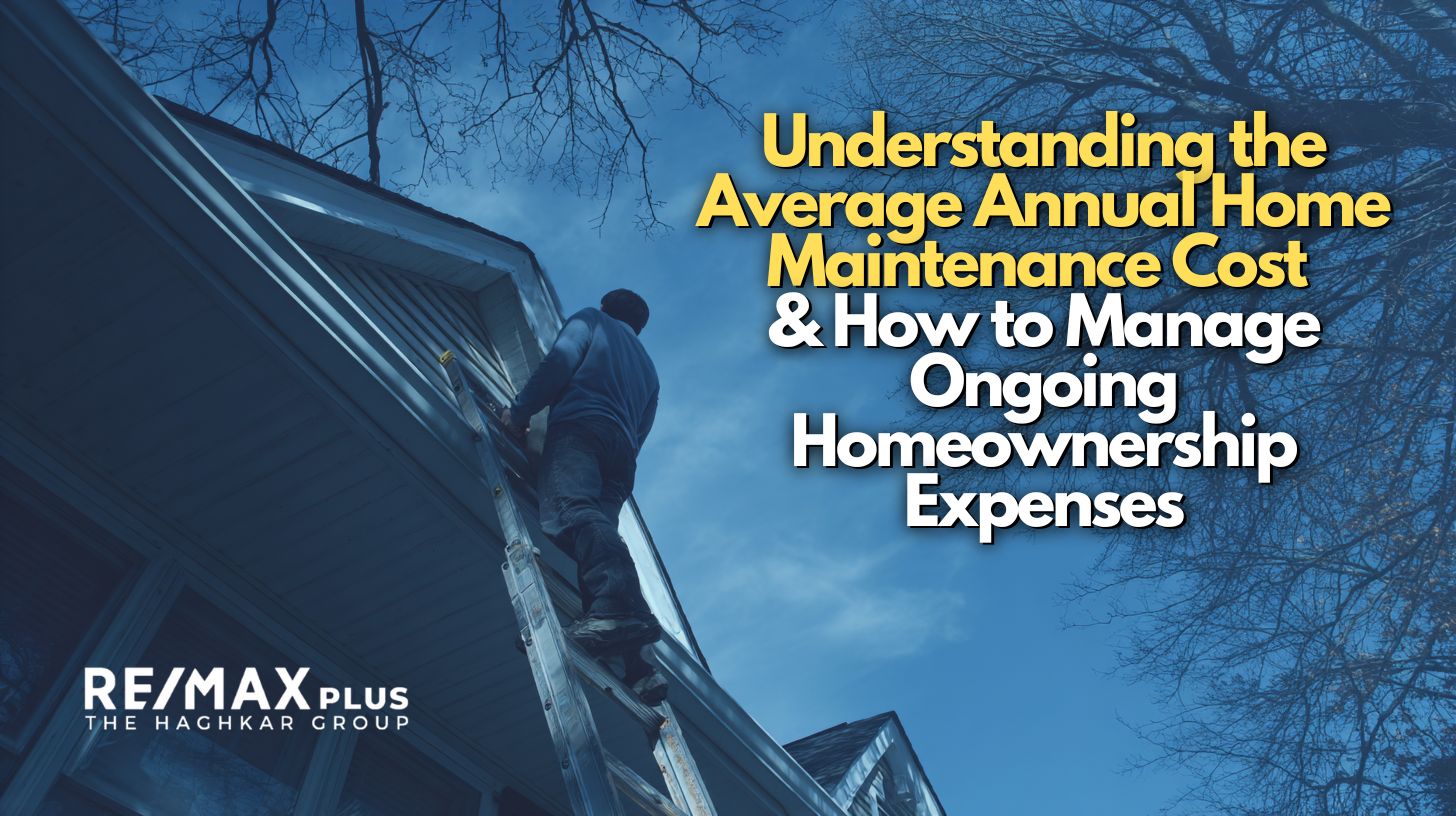
03 Nov Understanding the Average Annual Home Maintenance Cost
Understanding and Managing Ongoing Homeownership Expenses
Owning a home isn’t just about paying the mortgage. It’s a long-term financial commitment that involves multiple layers of costs. Understanding and effectively managing these ongoing homeownership expenses is crucial for maintaining financial stability. One significant area that demands attention is the average annual home maintenance cost. Recognizing these expenses is key to ensuring your home remains a safe, enjoyable place to live.
Average Annual Home Maintenance Cost
What Are Home Maintenance Costs?
Home maintenance costs encompass a wide range of routine tasks necessary to keep your property in good shape. These include:
- HVAC servicing
- Gutter cleaning
- Landscaping
- Appliance upkeep
- Roof maintenance
- Essential repairs
These tasks ensure the home’s safety and functionality, preventing larger, more expensive problems down the line. Zillow provides detailed insights on this topic, supporting the need for regular upkeep.
Typical Expenses and Estimation Rules
The average annual home maintenance cost varies widely across different homes and locations. Generally, you can expect:
- $1,400–$2,300 annually for regular upkeep, although this doesn’t include unexpected repairs. HomeKeep explains the extensive variability.
- A broader estimate places maintenance around $10,867 per year, incorporating more extensive projects. Zillow offers more insights.
- When factoring hidden costs like insurance, taxes, and utilities, annual expenditures can soar over $18,000. This DebtWave article elaborates further.
To help budget for these expenses, consider these estimation rules:
- 1% Rule: Save 1% of your home’s value annually. For a $300,000 home, this means setting aside $3,000 each year. HomeKeep provides a comprehensive guide on budgeting.
- Square Foot Rule: Allocate $1 per square foot per year. A 2,000 square foot house would require a $2,000 annual budget.
Influencing Factors
Several factors can influence your home’s maintenance costs:
- Home Size: Larger homes naturally incur more costs.
- Home Age: Older homes may demand frequent repairs. This source from the Census Bureau deeply explores the costs associated with aging homes.
- Location: Costs vary significantly by region. For example, maintenance costs in cities like Seattle, Boston, and San Francisco tend to be higher due to labor costs and climate conditions. Zillow details these variations.
Is a Home Warranty Worth It?
Understanding Home Warranties
A home warranty is a service contract that covers the repair or replacement of major home systems and appliances. Unlike homeowners insurance, which covers unexpected damage, a warranty deals with eventual system and appliance breakdowns.
Pros and Cons of Home Warranties
Pros:
- Offers financial predictability for covered breakdowns.
- Particularly beneficial for older homes with aging appliances and systems.
- An asset for homeowners lacking a robust emergency savings cushion.
Cons:
- Excludes pre-existing conditions and often imposes service fees.
- Coverage limitations may not fully meet the homeowner’s needs.
When and When Not to Get a Home Warranty
Consider a home warranty when:
- Purchasing or selling a house, especially older ones.
- Systems or appliances are aging and you’re not inclined towards DIY repairs.
A warranty might be unnecessary for:
- Newer homes that already come with manufacturer warranties.
- Homeowners with adequate savings and DIY repair skills.
Navigating the Property Tax Appeal Process
Steps to Appeal Property Taxes
Navigating the property tax appeal process can be daunting but beneficial. Here’s a simplified guide:
- Review Assessment: Check your assessment notice for accuracy.
- Research Comparables: Find and document comparable property values.
- Gather Evidence: Use recent sales data, photos, and appraisals if you believe the value is incorrect.
- Submit Appeal: File a formal appeal with necessary documents before the deadline.
- Attend Hearings: If required, prepare to present your case at a hearing.
Tips for a Successful Appeal
- Understand local guidelines and deadlines to determine your best course of action.
- Weigh the benefit of potential savings against the time and effort required.
- Learn from success stories where clear evidence such as incorrect square footage or overlooked defects swayed appeal outcomes.
Homeowners Insurance Shopping Tips
Importance of Homeowners Insurance
Homeowners insurance is vital to protect against financial losses resulting from disasters, theft, or liability claims. It’s often a mortgage requirement.
Effective Shopping Tips
- Compare multiple premiums and examine coverage limits, deductibles, and exclusions.
- Bundle policies to unlock discounts—many insurers decrease rates when you combine home and auto insurance.
- Consider Coverage Needs: Ensure the coverage meets the cost to rebuild rather than the market value.
- Evaluate Risks: If prone to natural disasters like floods or earthquakes, special policies or riders might be necessary.
- Research Providers: Beyond prices, check the company’s customer service reputation and the ease of claims processes.
Using a Utilities Cost Estimator
What Is a Utilities Cost Estimator?
Utilities cost estimators provide homeowners with projected monthly expenses for water, energy, gas, and potentially internet and TV based on specific property details.
Benefits and Tools
- These estimators aid in forming accurate monthly budgets.
- They highlight excessive usage, suggesting efficiency improvements may be needed.
Recommended Tools: Utility company calculators, government resources, or comprehensive apps with local data integration can effectively estimate utility costs.
Benefits of a Home Energy Audit
Definition and Process
A home energy audit involves a professional evaluation of a home’s energy flow to identify inefficiencies and potential improvements.
Why Conduct a Home Energy Audit?
- Cost Savings: Highlighting efficiency leads to lower utility bills.
- Safety Improvements: Identifies hazards like gas leaks or faulty wiring.
- Increased Comfort and Value: Enhancing energy efficiency can improve both living comfort and market value.
Steps to Arrange an Audit
- Contact your local utility provider—many offer incentives or rebates for undergoing energy audits.
- Employ certified energy auditors for thorough evaluations.
- Expect to review aspects such as insulation quality, HVAC systems, lighting efficiency, and appliance usage.
Final Thoughts
Proactively understanding and managing ongoing homeownership expenses can significantly contribute to financial stability and the long-term value of your property. By leveraging available tools, professional services, and guidelines, homeowners can effectively navigate the complexities of maintaining their biggest investment.
Stay Connected and Informed
Your experiences and questions about home expenses are valuable to others. Share them in the comments below. For continued learning, subscribe now for more homeownership insights and financial management tips. If you have specific needs or questions, consider exploring the expertise offered by real estate specialists at RE/MAX Plus, who can guide you further on your journey.
Explore Ways to Save Money as a Homeowner for practical strategies to reduce various costs associated with owning a home.
For insights on Home Maintenance Costs, read more about the annual trends and necessary budgeting approaches in articles like The Truth About the Annual Cost of Home Maintenance.
Considering a Home Warranty? Check out Is a Home Warranty Worth the Money? to evaluate its benefits and limitations.
When navigating the property tax process, refer to How to Successfully Appeal Property Taxes for additional information on potentially lowering your tax burden.
For potential sellers, understanding the nuances of pricing is critical. Review strategies in How To Sell Your Home in a Buyer’s Market to enhance your selling strategy in competitive conditions.
Previous Blog Posts:
- How To Sell Your Home in a Buyer’s Market
- Home Buying 101
- Tips To Increase Your Home Appraisal
- Air Conditioning Energy and Money Saving Tips
- Home Staging Tips

